November 1, 2025 – Day 2 in Bhutan (Ramthang, Rimapung Chiwog)
Hello. Today, we officially began our Bhutan inspection and inauguration ceremony schedule. It has been raining continuously in Bhutan for the third day.
After spending a night in Trongsa, Sunim completed his morning practice and meditation, then departed from Trongsa at 5 AM before dawn, heading to Zhemgang.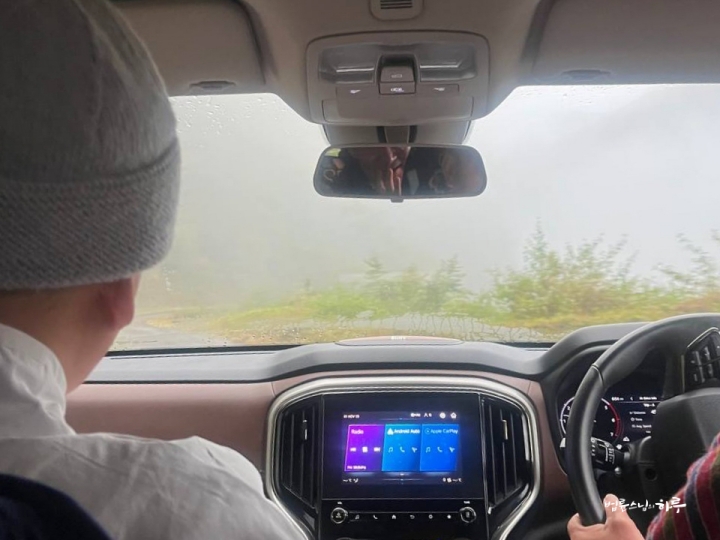
After driving for 4 hours on steep mountain roads, he arrived at Panthang, where the JTS Center is located, at 9 AM. When Sunim got out of the car, the JTS volunteers working there warmly welcomed him.
Sunim shook hands with each Korean and Indian volunteer, offering words of encouragement.
“Thank you all for your hard work.” 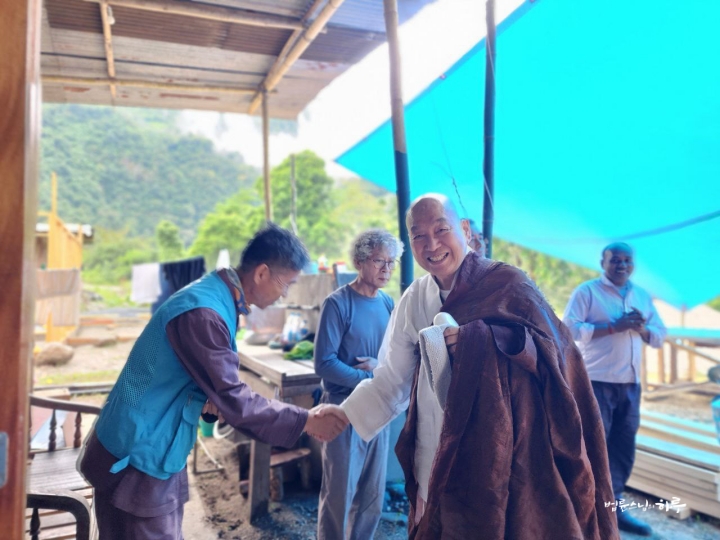
He then presented prayer beads brought from Korea as gifts to the JTS volunteers and Bhutanese officials who would be accompanying him during this visit to Bhutan. He also personally distributed medicinal rice cakes made and sent by Bangkok Jungto members to the volunteers.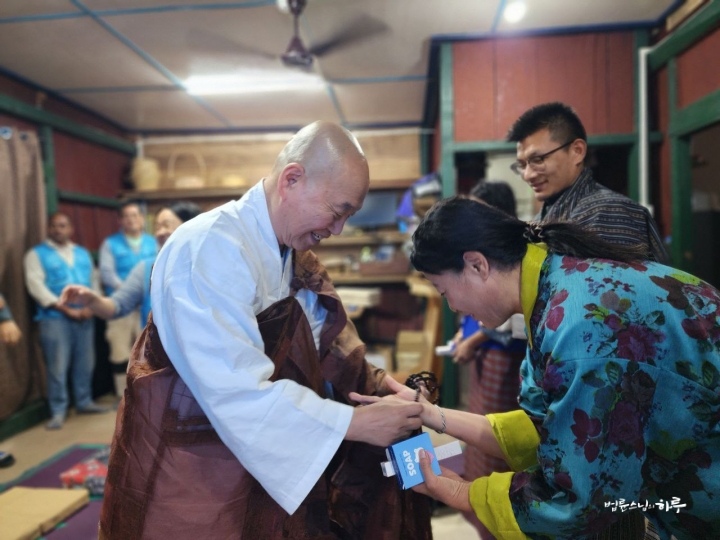
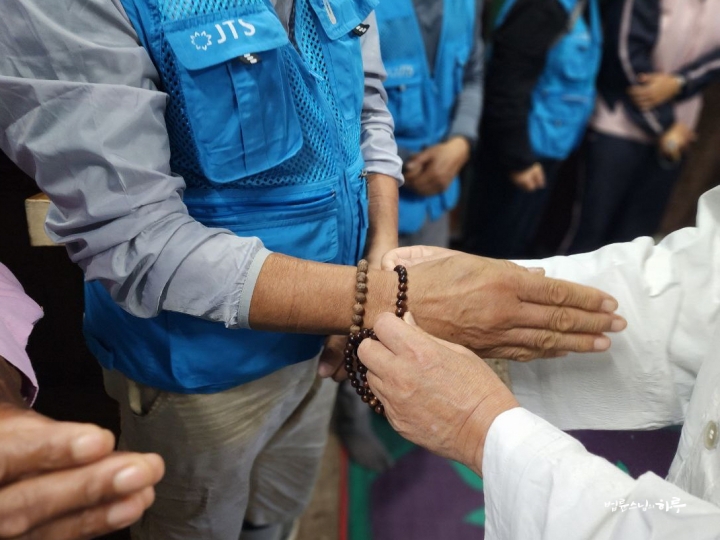
The JTS volunteers offered three prostrations to Sunim.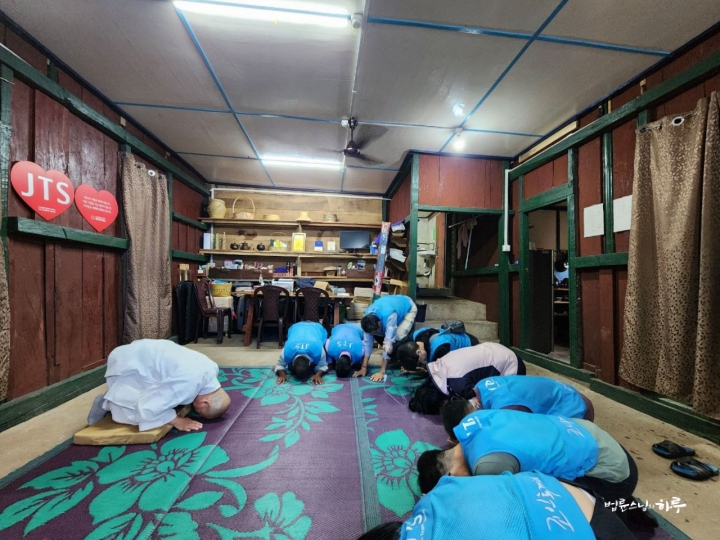
After exchanging brief greetings, they discussed today’s schedule and toured the construction site where a warehouse was being built next to the JTS Center. Only the pillars had been erected so far.
“Don’t work too hard. Get help from the villagers whenever possible.” 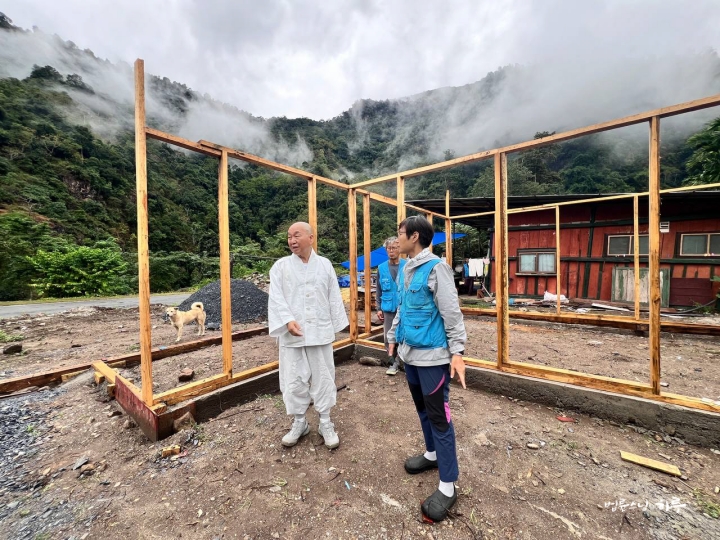
After discussing how to build the warehouse, they took a short break. At 11 AM, they moved to Budashi Primary School for the water project inauguration ceremony.
Budashi Primary School is where JTS conducted a water improvement project. A new water source intake structure was built here, along with a new 8,000-liter water tank. Damaged water taps were repaired, and new ones were installed. Additionally, approximately 2.2 km of new piping was connected to supply drinking water to classrooms and toilets.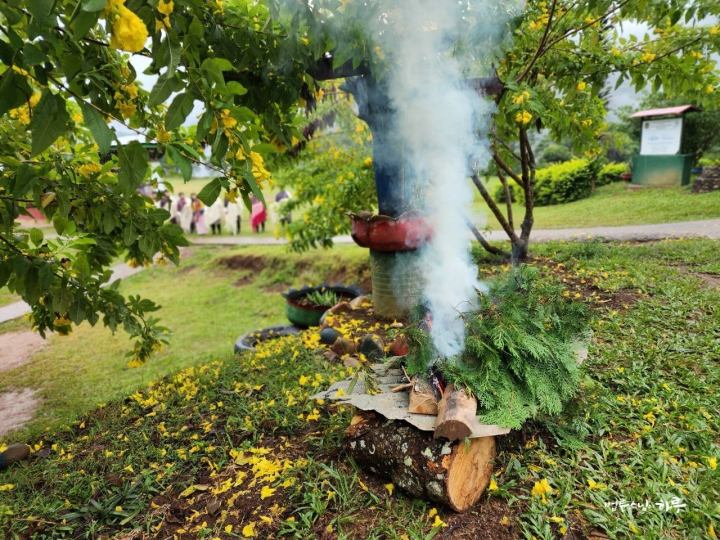
At 11:10 AM, when they arrived at the school, school officials came out to welcome them.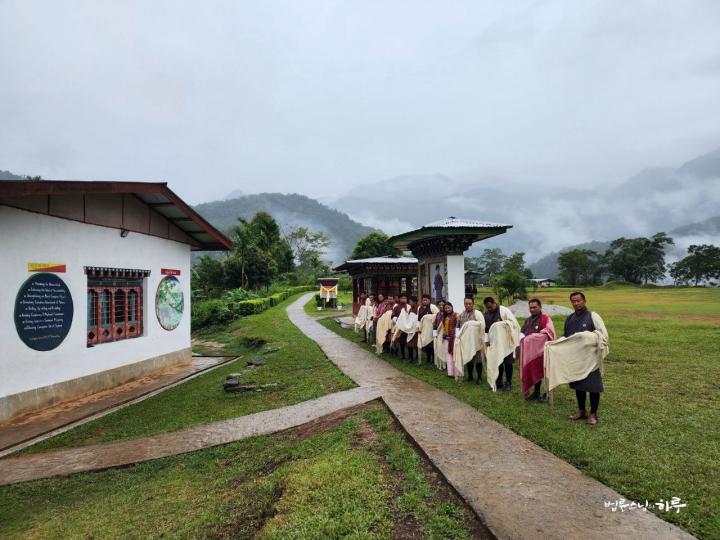
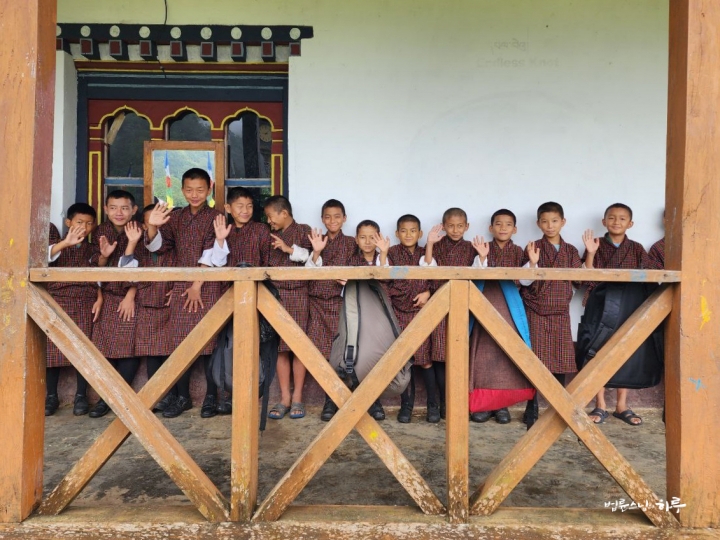
The inauguration ceremony began with the unveiling of the plaque.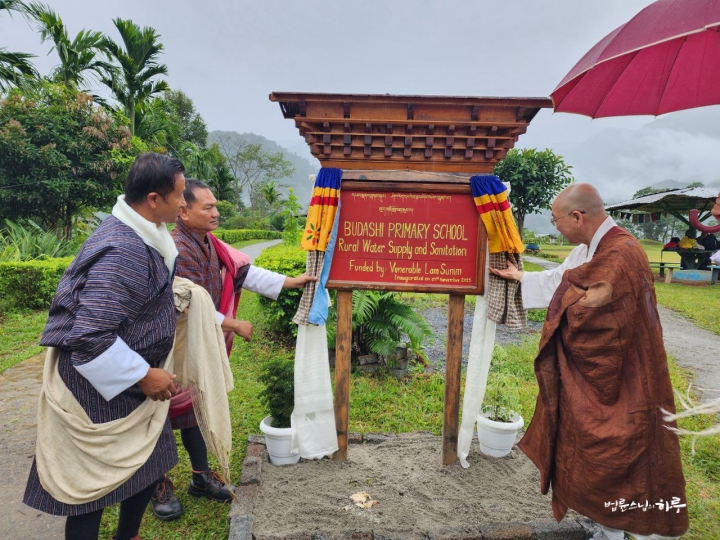
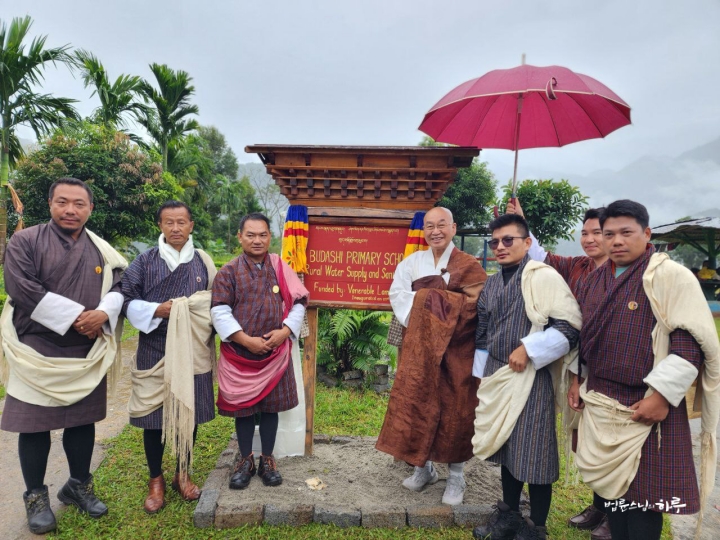
Sunim first inspected the two newly built water stations. He personally turned on the taps to check the water flow. He then carefully examined the toilets and classroom interiors.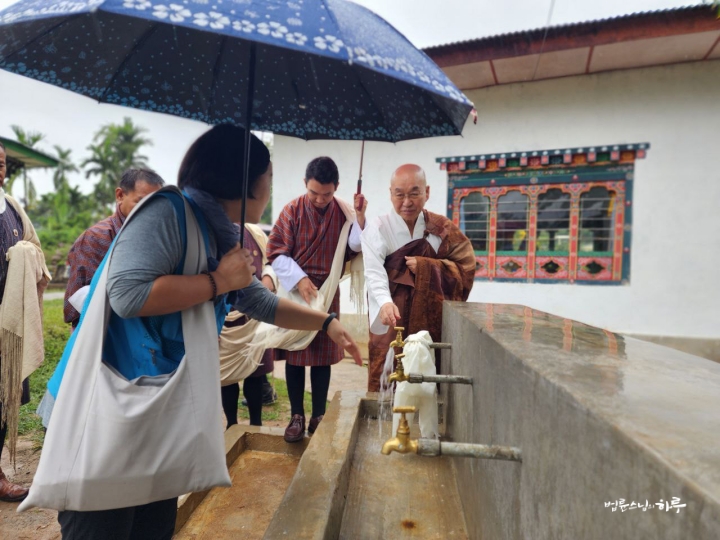
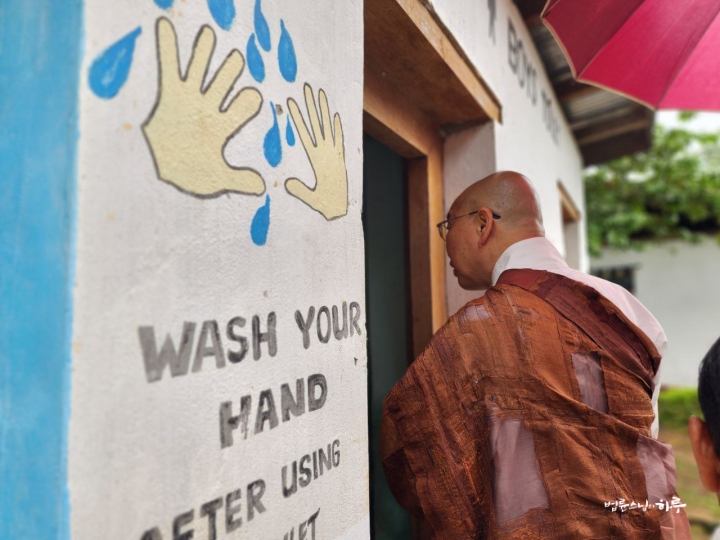
He also exchanged smiles and greetings with children who were watching him with curious eyes.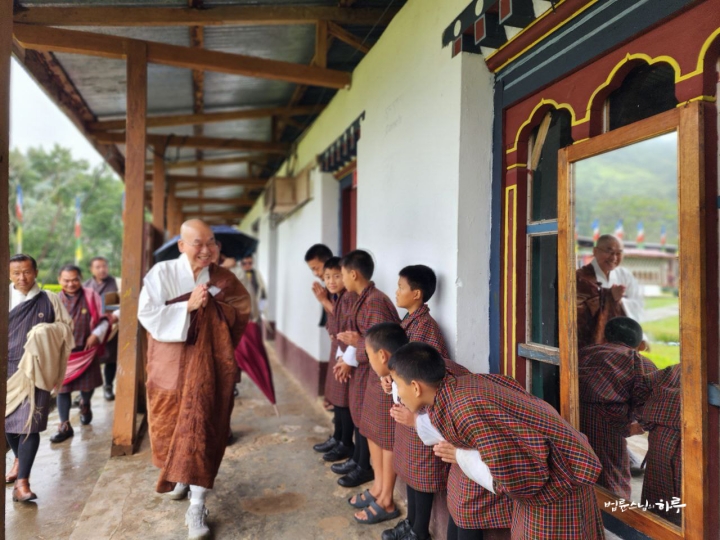
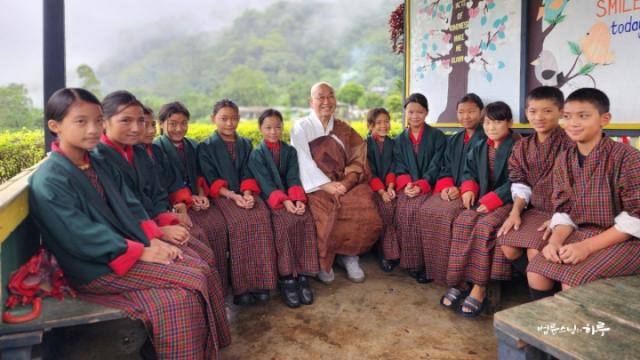
After touring various parts of the school, lunch was served at 11:30 AM. In one corner of the dining area, candles were lit to commemorate the 17th anniversary of the Bhutanese King’s coronation. Sunim put his palms together toward the flames and offered a prayer.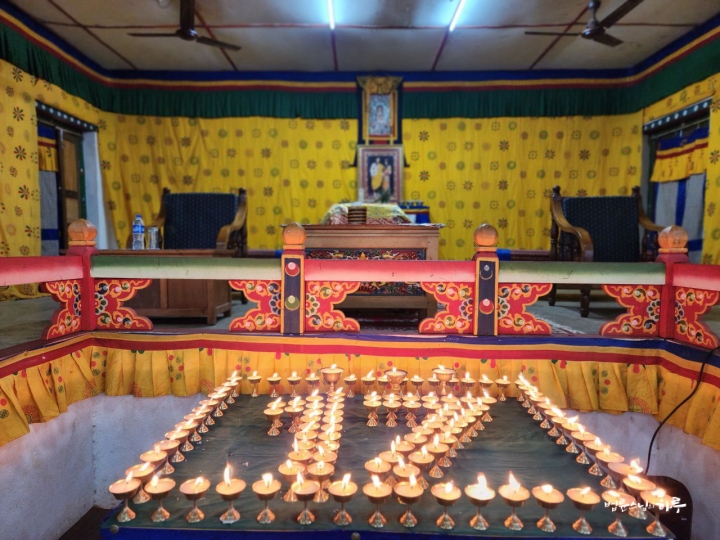
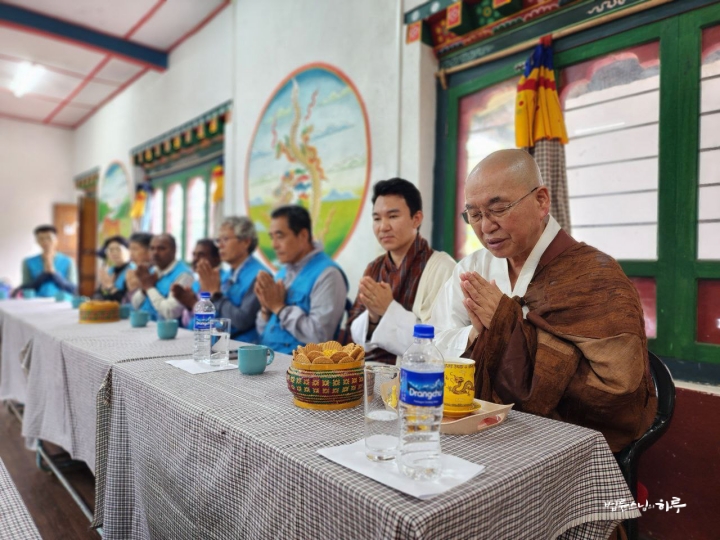
After the meal, Sunim expressed his gratitude to the villagers who had prepared the food and presented a donation to the Tshogpa.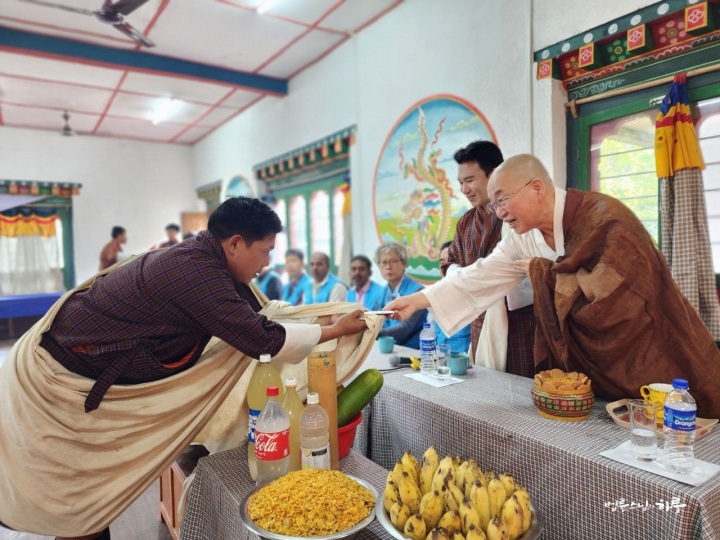
After finishing the meal, he sat in a circle with Bhutanese officials, drinking tea and having a conversation.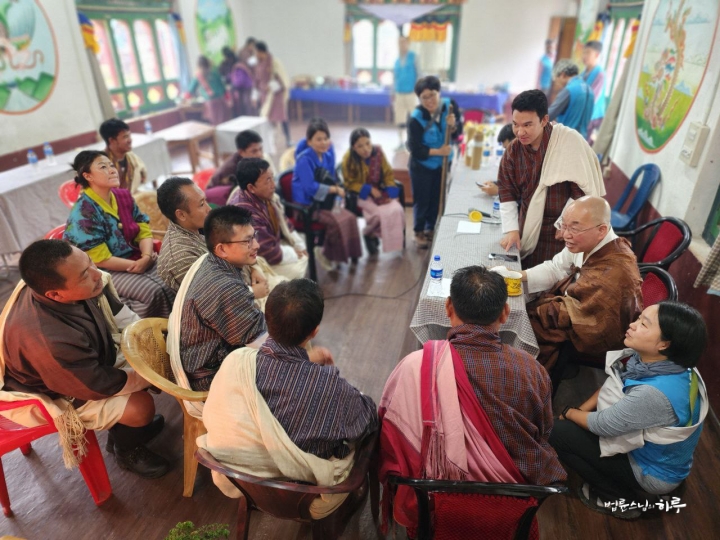
At 12:25 PM, they departed for Ramthang village. While traveling by car, they had to wait for about 5 minutes as road repair work was being carried out on a section blocked by flooding, before continuing their journey.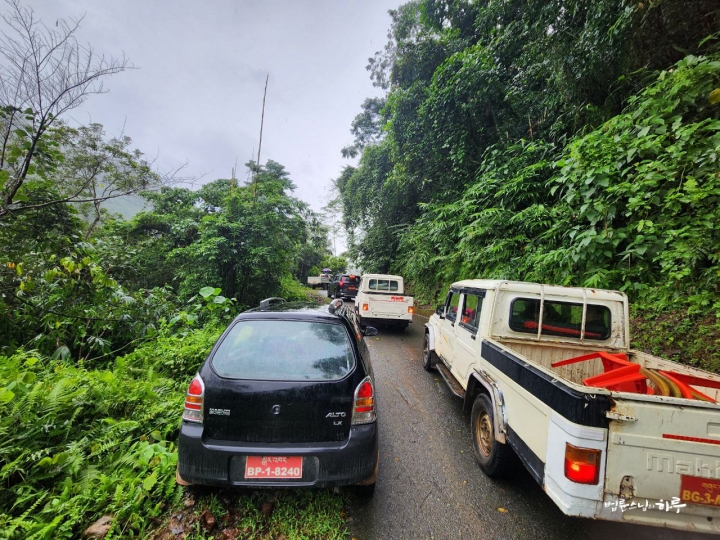
They arrived at the village entrance at 12:50 PM. It was still raining. Since the newly built house was located below the hill, they carefully walked down the slippery downhill path, guided by the Tshogpa, the village leader.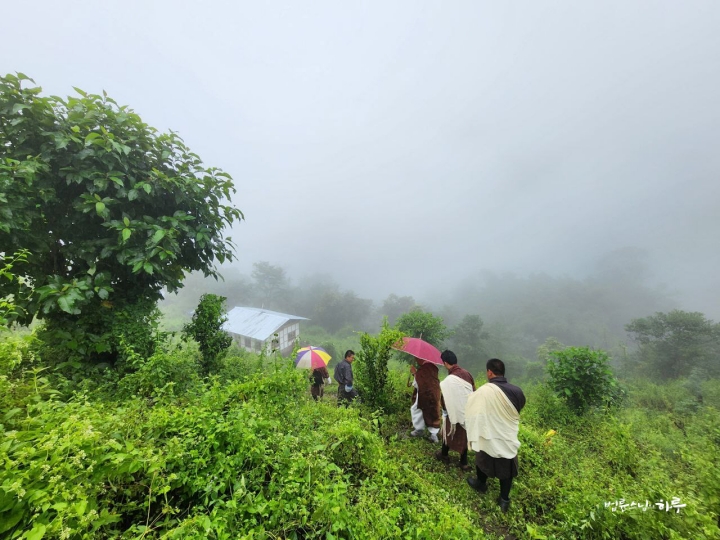
A simple inauguration ceremony was held at 1 PM in the rain. They untied the ribbon hung at the house entrance and sprinkled alcohol throughout the house using pine needles.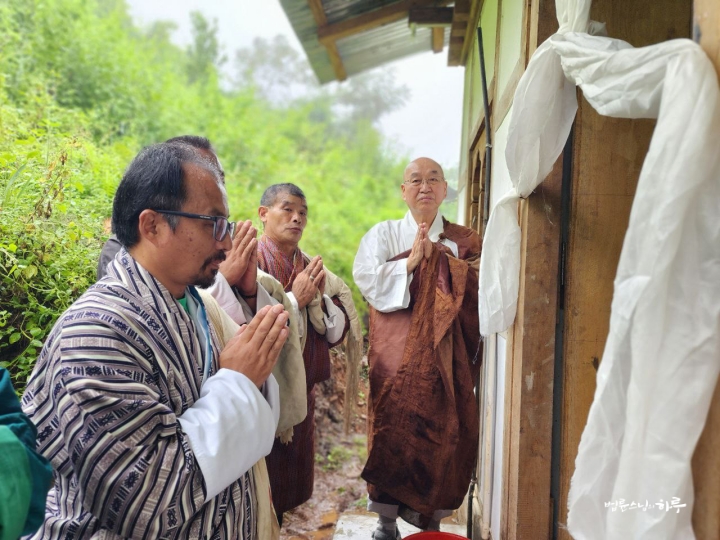
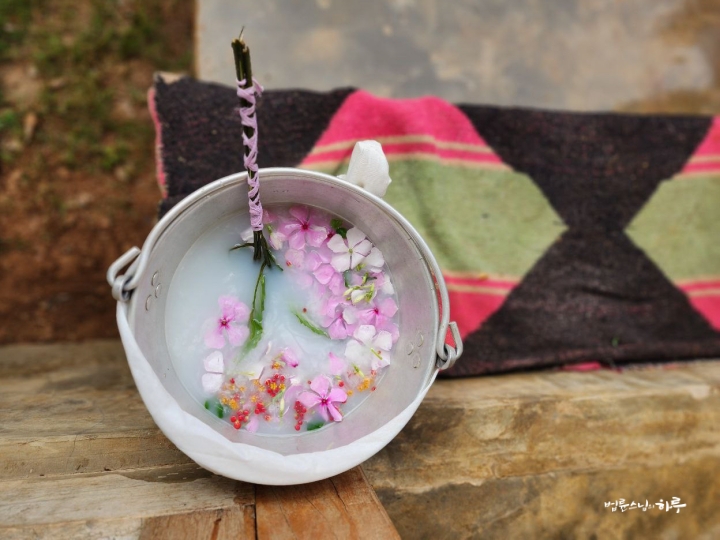
After the inauguration ceremony, Sunim toured the newly built house, examining both the interior and exterior.
“It’s been built very neatly.” 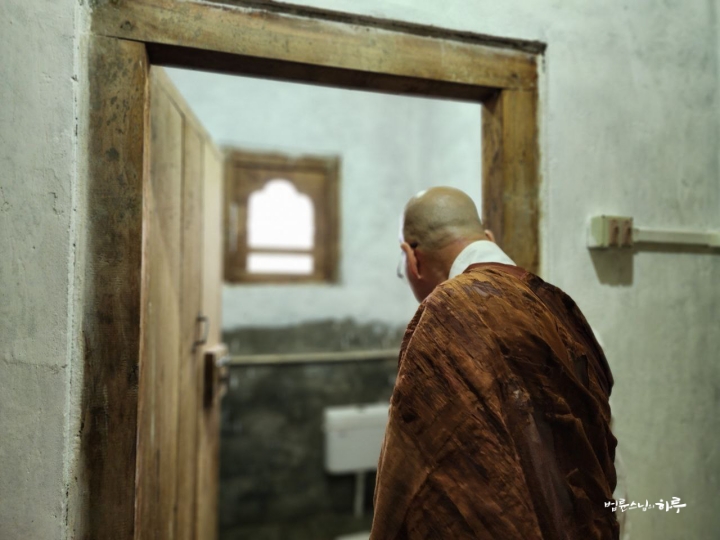
After touring the entire house, he conversed with the villagers present and listened to the stories of those who participated in the construction. The village carpenter provided technical guidance, and all materials were voluntarily transported by the villagers. Not only people from Ramthang but also residents from nearby Mudashi village and other areas came together to help build the house.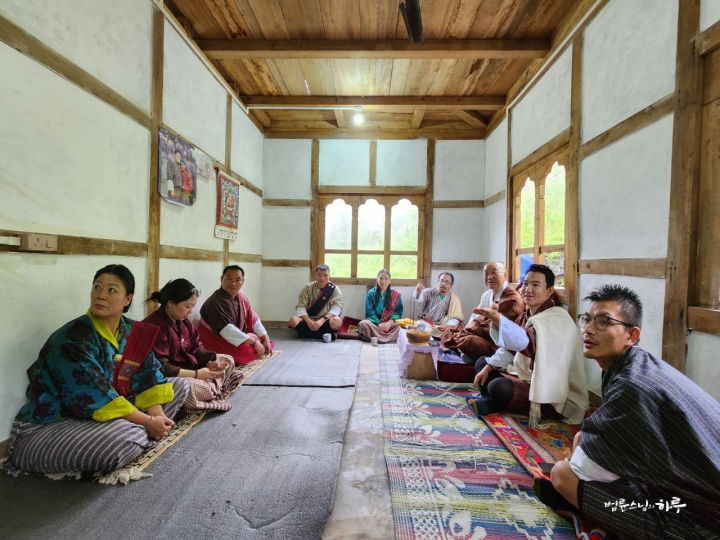
“Who is the owner of this house?”
The Tshogpa answered on their behalf.
“The owner’s son is a soldier, and the daughter-in-law suffers from epilepsy and frequently visits the hospital. Since the children didn’t have a proper place to live, they earnestly requested that a house be built, and now it’s completed. They asked me to convey their sincere gratitude.”
Sunim nodded and expressed his thanks to the Tshogpa and the villagers.
“Thank you for all your hard work.”
At 1:20 PM, they moved to the next house. They climbed back up the slippery path wet from rain. Sunim stopped several times, struggling to move forward.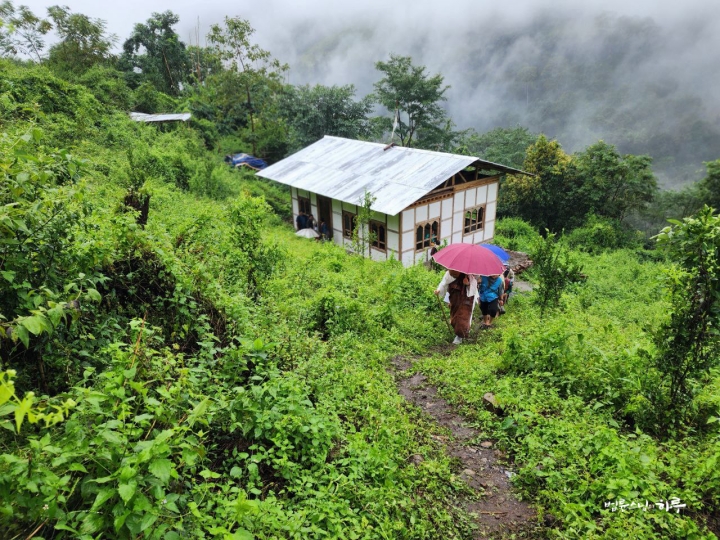
They arrived at the next house at 1:40 PM. They untied the white cloth and offered prayers.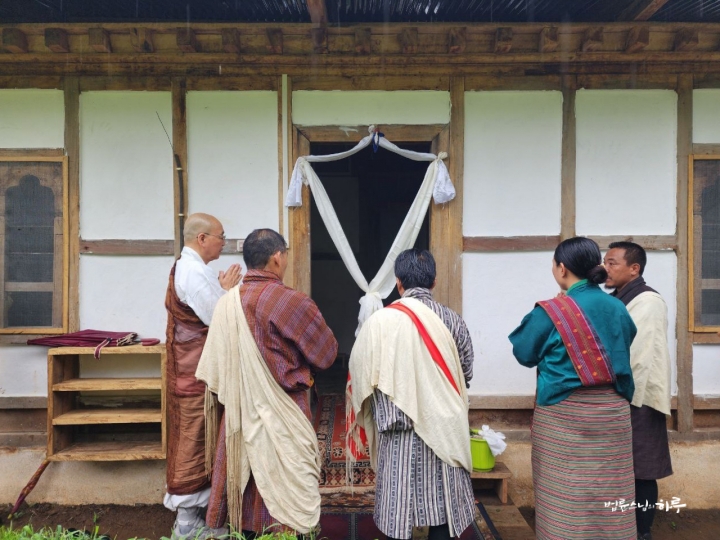
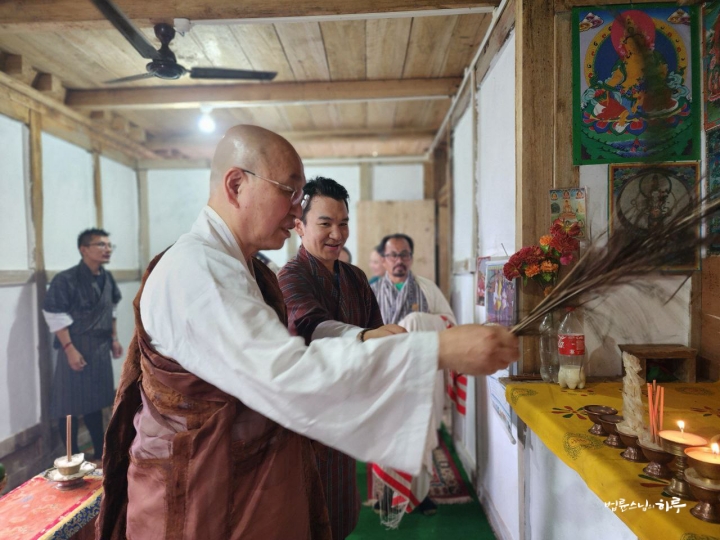
He entered the house and had a brief conversation with the family. Sunim asked several questions.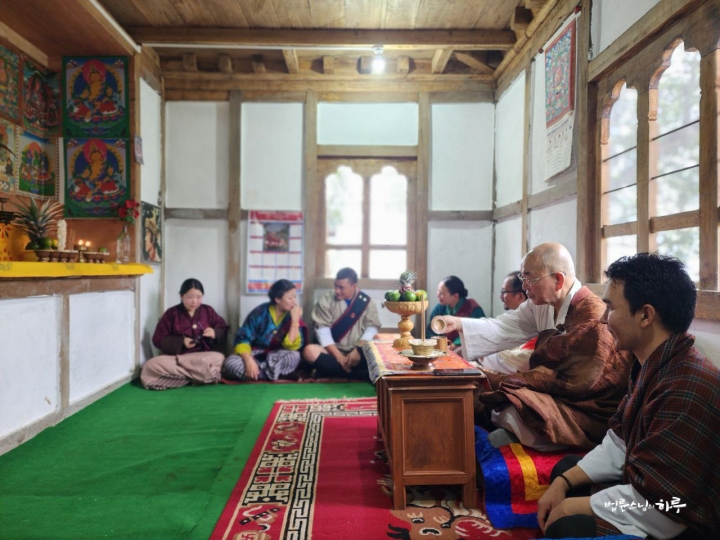
“What kind of family lives in this house?”
“There are four family members in total. A couple lives here with their two daughters. The older daughter is an adult, and the younger one is not yet ten years old.”
“Did they not have a house before?”
“No, they were too poor to build a house.”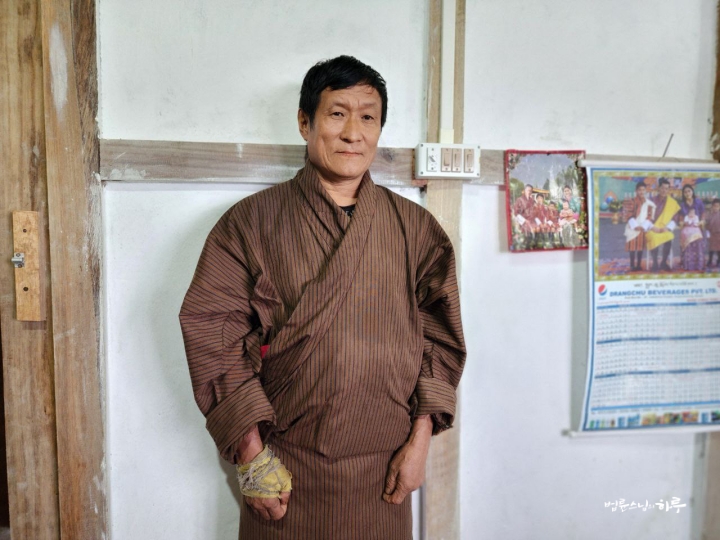
This house was also built with the help of the villagers. Residents from several nearby villages also contributed to building the house.
“Did all the people in this village work together to build the house?”
“Yes, not only people from this village but also residents from other villages helped together.”
After completing all the inauguration ceremonies for the newly built houses in Ramthang village, they moved to the Goshing Gewog office at 2 PM. When Sunim arrived at the Gewog office at 2 PM, about 30 villagers warmly welcomed him.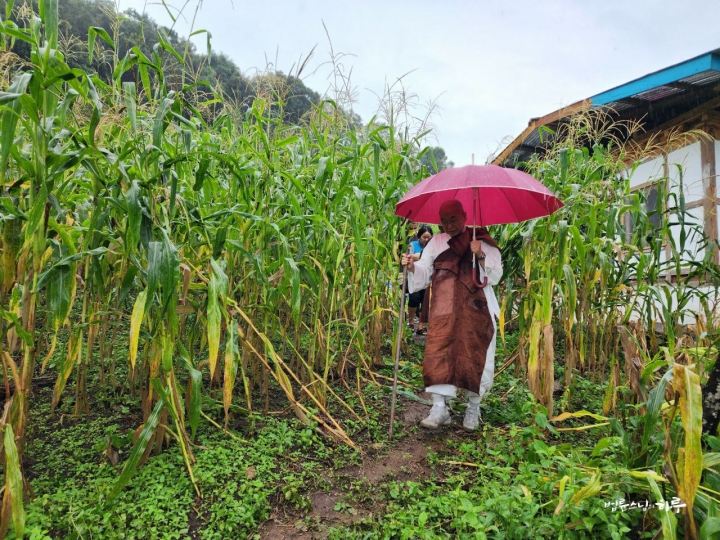
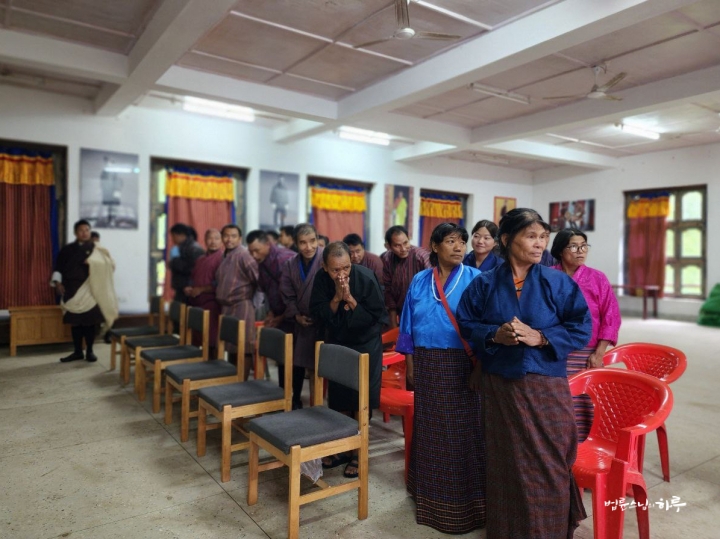
After arranging for those sitting in the back to move closer to the front, the conversation began. Sunim emphasized that the house-building project was the most difficult task and encouraged the villagers who had worked hard.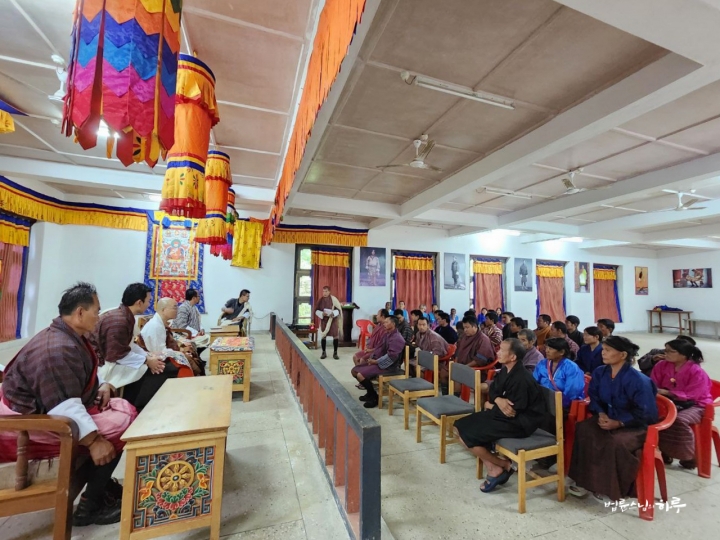
You’ve Worked Hard Building Someone Else’s House for Two Months
“Thank you for working together with the villagers to build houses. Building your own house is difficult enough, but building someone else’s house must have been even harder. Among the seven types of pilot projects, building houses seems to be the most difficult task. Installing water supply systems is something villagers willingly participate in because everyone needs to drink water. When the roads that villagers use together are muddy and inconvenient, everyone participates well in the road paving project. Residents also actively participate in paving muddy or steep sections of roads from the Chiwog to the village because everyone needs to use vehicles. The same goes for installing irrigation channels. When it comes to fencing fields, people can do it alone if it’s their own land, or work together when lands are adjacent.
However, the most difficult project was building houses. People might think, ‘Why should I help build a house for someone who didn’t help when I was building mine?’ And while they might help for a day or two, building a complete house usually takes more than two months, making it difficult to participate for many days. Also, well-off households can request cooperation by providing meals or drinks to the villagers, making support easier, but poor people don’t have such resources. That’s why having villagers work together to build houses has been the most difficult project we’ve undertaken so far.
Moreover, building houses requires professional carpenters. However, professionals usually want to be paid rather than volunteer, so labor costs are inevitable. But the purpose of this project is not for someone else to build houses for them. The original intention is to support materials when people need to build their own houses but don’t have money for materials. In other words, it’s a program where you do the work yourself, but if you lack funds for materials, you receive material support. However, poor people often have sick family members, making it difficult to build houses themselves. Also, being in difficult circumstances, they probably haven’t been able to help other villagers much. This makes it challenging for villagers to come together to build houses for others. You have accomplished this difficult task so well. 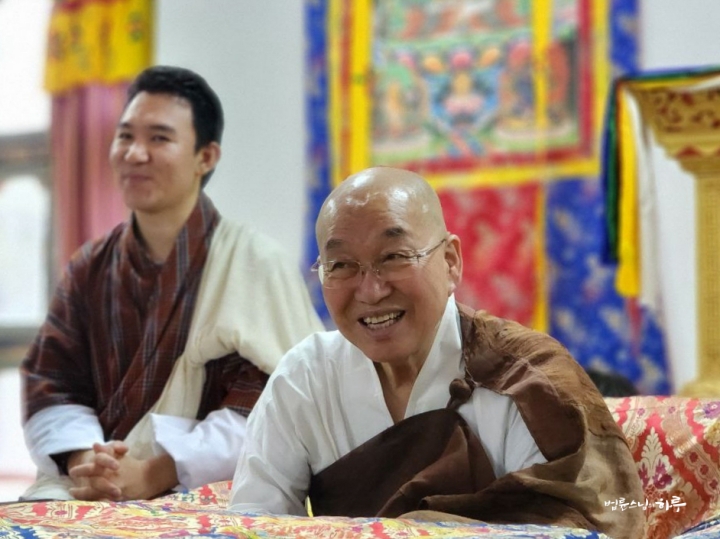
Building Houses Together, Building Community Together
JTS first built a house in Kolphu Chiwog, Trongsa District. It was very difficult at that time. Initially, the villagers participated together, but later they stopped participating, so the carpenter ended up building it almost alone. This resulted in high labor costs. This went against the original purpose of the project. So afterward, we informed people that they should apply only if the villagers would work together to build the house, otherwise they shouldn’t apply. The idea was for people who wanted to help their poor and struggling neighbors but lacked the resources to do so alone to join forces and build houses together. In other words, we selected applicants who promised that if we provided only the building materials, the villagers would help each other build the houses.
You all did a lot of volunteer work building two houses this time. In my opinion, building one or two houses a year seems appropriate. However, the Tshogpa said they want to build nine houses next year. While I appreciate their intention, I think it might be somewhat difficult in reality. I fully understand the Tshogpa’s desire to build houses for the residents. However, building houses is ultimately something the villagers must do themselves. But since the villagers not only have to build houses but also farm and attend to their own work, building nine houses seems somewhat excessive. Of course, the Tshogpa says it’s possible. While building houses is a good thing, I have doubts about whether all the villagers have agreed to this. Also, in the process of building houses, professionals like carpenters need to work for about one or two months. Then the question is whether the Gewog can afford those labor costs. The state government says they don’t have such a budget. 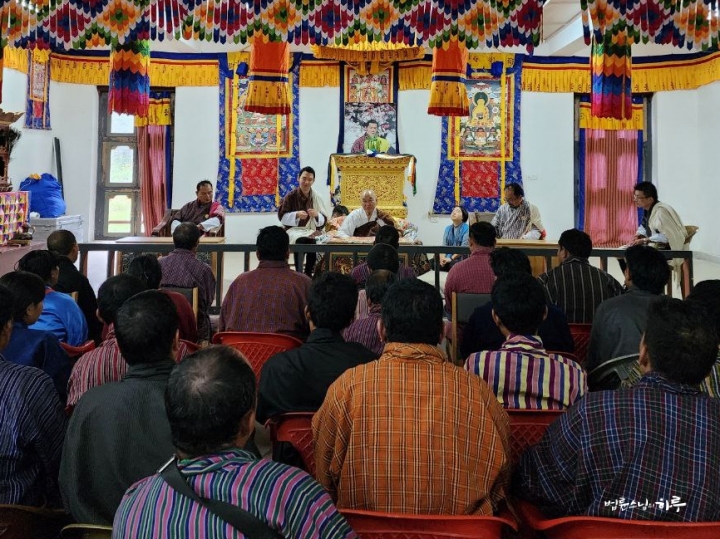
According to the principles established at the beginning of the project, professional labor costs are not included in JTS project support, so the Bhutanese government is responsible for them. However, the Bhutanese government says that if they miss the budget planning period, they have to wait until next year. JTS has a rule that everyone participates as volunteers. No one, whether Korean or Indian, receives wages for their work. This operating principle may be difficult to understand in general. You can think of it as a project where, when you want to pave roads in your village or do other necessary work, you receive only materials and do the work yourselves. When you approach it with this mindset, JTS will always provide support. However, if not, support becomes difficult. Since there’s talk of building nine more houses next year, I want to make this point clear once again. Now that you’ve built two houses, was it worth volunteering? Was it difficult?”
“We were happy. We have two new houses now.”
“Raise your hand if you worked for more than ten days.”
The majority of the villagers raised their hands high.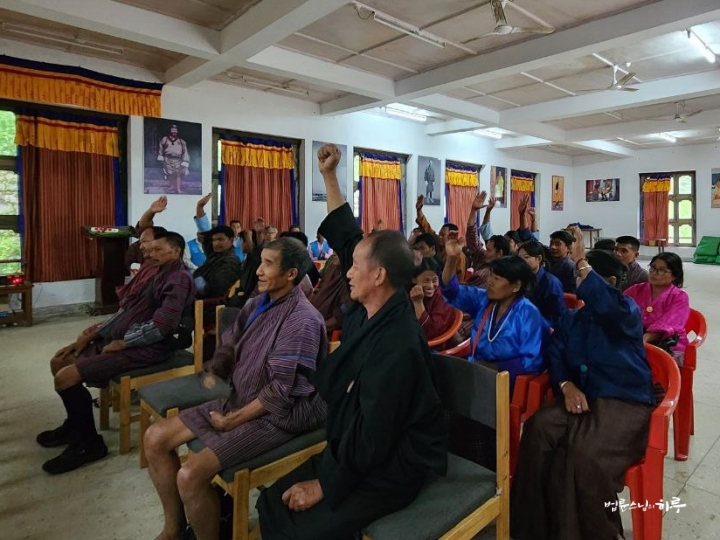
“Would it be possible to build houses during the farming off-season?”
“Yes!”
“But you shouldn’t set too many goals that become too burdensome. While it’s good to plan to build many houses, you must have the mindset that you will build those houses yourselves.”
“If you just provide the materials, there won’t be any major problems. Mainly, women will do farming, and men will build houses. We plan to organize teams and proceed.”
“Last time when we laid water pipes in Rebati Chiwog, people from each household came out and worked for nearly a month. Even though it was really difficult work, that person said, ‘It was hard, but it was really good.’ The villagers were extremely happy because water came right to their homes. They also said, ‘Even though I suffered like this, I did it with joy because not only I but also our descendants will be able to drink this water.’ Like this, you too should participate with the mindset of ‘Even though it’s hard work, I’m happy because my neighbors can live comfortably thanks to my efforts.’ But if you think ‘The Tshogpa started this big project and only we are suffering’ and complain, it would be better not to participate at all.”
“We are confident we can do well. We’ve already cut most of the wood and done quite a bit of preparation in advance.”
“But right now, your faces don’t look very bright. I should be happy to be with you all, but you shouldn’t think ‘Sunim started this work and is only making us suffer.’ You shouldn’t think, ‘Why did Sunim come to our village to bother us instead of practicing in the mountains?’ I came here to help you develop the mindset of ‘We cultivate our own village.’ You should approach this with the mindset of ‘We build houses for those without homes in our village,’ and ‘We help repair homes for neighbors living in poor conditions.’ 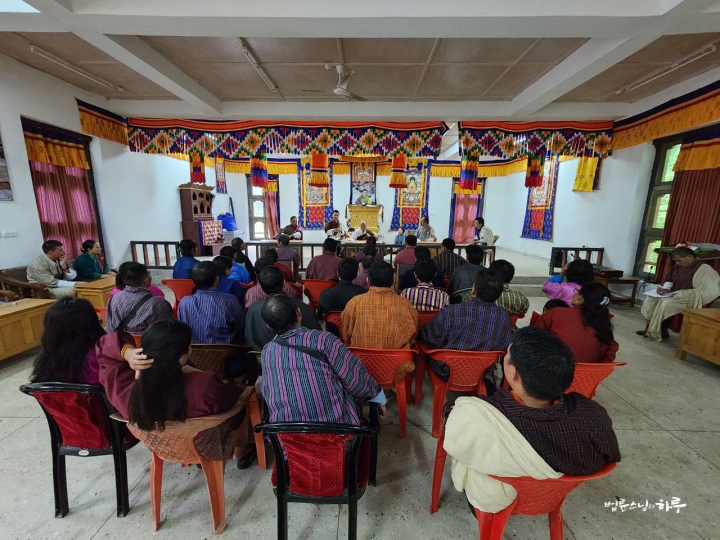
Our Village with Our Own Hands
Even when I came here today, there was a very slippery road because of the rain. At such times, you should participate with the mindset of ‘That road is too slippery when it rains, so let’s apply cement to make it easier to travel.’ When cars can’t climb steep unpaved roads in the rain, you should have the mindset of ‘Let’s at least pave that section ourselves.’ Also, when water flow in the irrigation channels gets cut off, you should think ‘Let’s reinforce it ourselves so water can reach those fields,’ or ‘Let’s enlarge the water tank or find a new water source so we can use water more abundantly.’ And if wild animals keep coming down and destroying crops, you should participate with the mindset of ‘Let’s work together to build strong fences.’
If you consistently work together like this for about 3 to 5 years, your village will transform into a much better place to live than it is now. Korea also had times when people lived more poorly than in Bhutan. But there was something called the ‘New Village Movement’ where residents took the lead in cultivating their villages. While there were government policies, the voluntary participation of residents played a major role. Like this, you too can directly cultivate your own village. Then young people won’t all have to leave for cities or foreign countries to earn money like they do now. If you continue living as you are now, eventually all the young people will leave and only the elderly will remain in the village.
True Buddhist Service: Building Houses for People
We must cultivate our village with our own hands. Of course, government support is necessary, but the Bhutanese government’s finances are not yet sufficient. So you must choose. Will you wait several years until the government provides support, or will you improve things directly with your own hands? In Korea too, most monks use donations to build temples. But I believe that true Buddhist service is not building temples but providing homes for people in need. That’s why I don’t use donations to build temples but prioritize supporting you in building houses. This is because I believe building homes for people to live in takes priority over temples. When there are no more people without homes in our village, then we can build temples. But temples should be built with your own strength. I hope you will fully understand this purpose and make your plans accordingly. 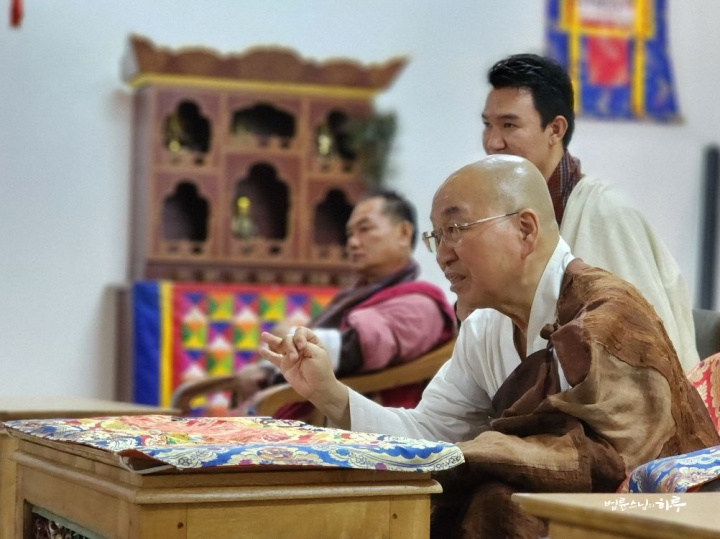
JTS is carrying out seven projects in total. First, building houses for those without homes. Second, repairing old houses. The repair targets will mainly be kitchens and bathrooms. Third, creating roads in villages. Fourth, repairing roads for vehicles. Fifth, building fences around fields. Sixth, creating water supply systems. Seventh, creating irrigation channels.
Among these, you can apply for as many as you can handle this year. Projects not completed this year can be applied for next year. Since this project will run for three years, there’s no need to apply for everything at once. Just proceed in order of priority. Since those without homes are probably the most urgent cases, you’ll likely apply for that first. Can you do this with a joyful heart?”
“We will do it with joyful hearts.”
“Do you all understand the purpose of this project?”
“We understood well through the interpretation.”
“How was it building two houses?”
“It was manageable.”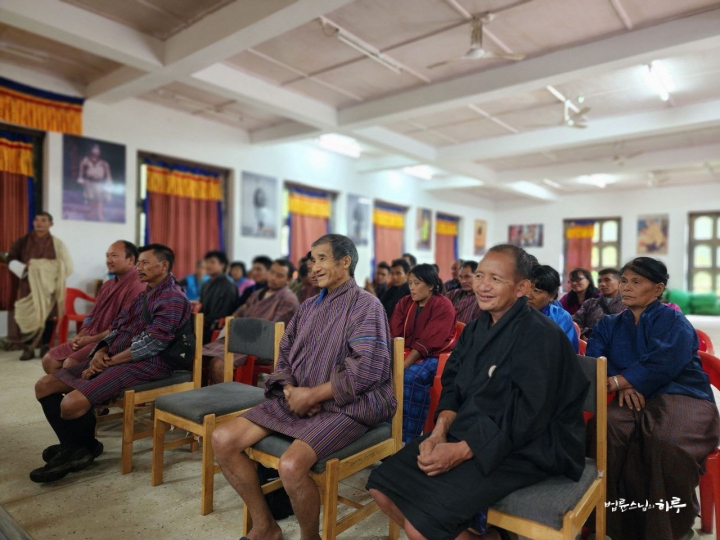
“It must have been very difficult to carry materials since the newly built houses are far from the road. At least it was downhill, which was fortunate. Thank you all for your hard work. I’m truly grateful to you. Thank you for building these houses with such effort even though they’re not your own homes. Even if the Tshogpa pushes for it, you don’t have to participate if you don’t want to. So please make your own decisions and apply.”
After conversing with the residents for an hour, Sunim distributed soap as gifts to the residents who had worked hard.
He also advised the Tshogpa not to push the work too hard.
“Don’t push too hard with the house-building plans, as it will be difficult for the residents.”
The Tshogpa replied with a smile.
“When residents see houses being built, they naturally gain energy.” (Laughter)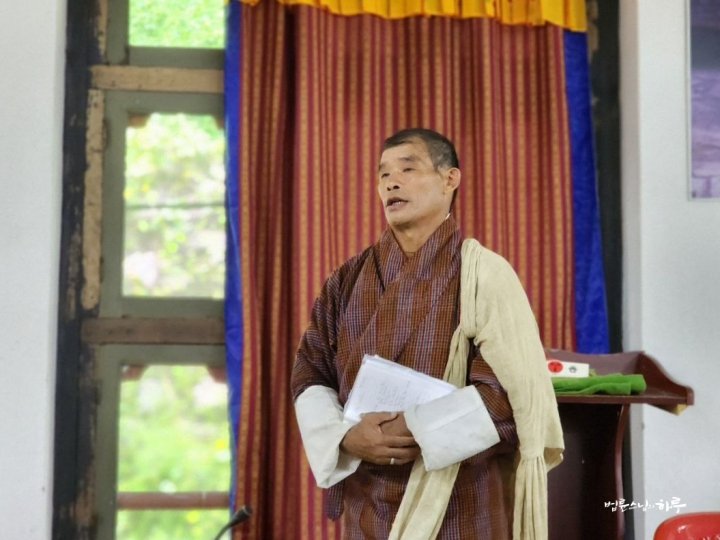
At 2:50 PM, after saying farewell to the residents of Lamtang village, they got back in the car and moved to Rimapong village.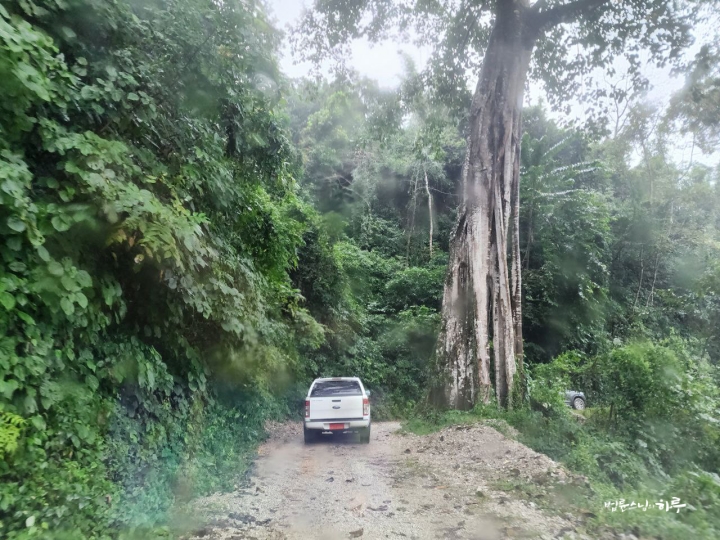
At 3:15 PM, they got out of the car and walked to the first new house in Rimapong village. Again, the house was on a steep hill. Sunim slowly climbed the slippery uphill path, catching his breath.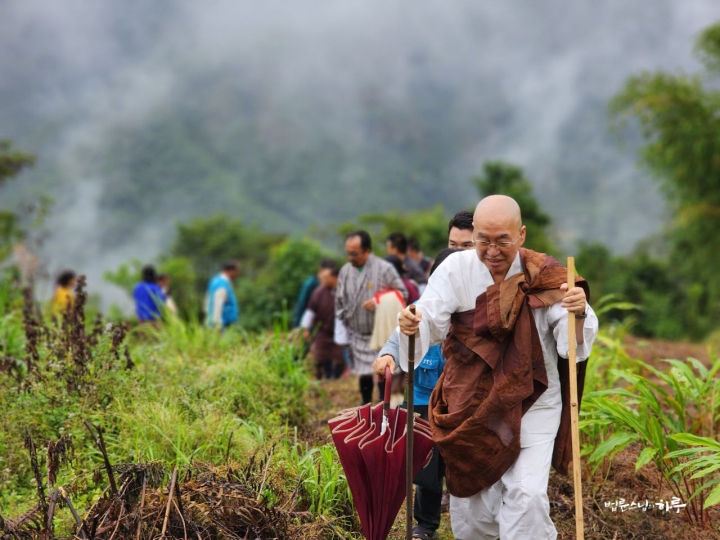
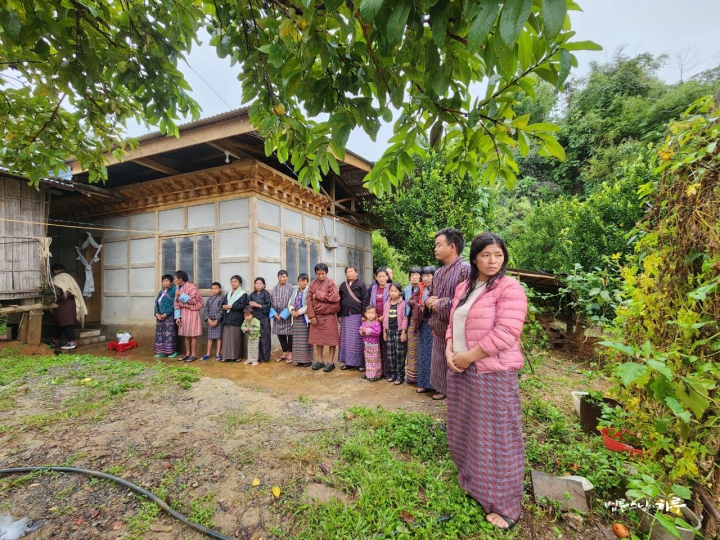
The family of the new house and village residents were waiting in front of the house. The completion ceremony began immediately. They untied the white cloth hanging at the entrance and offered blessings.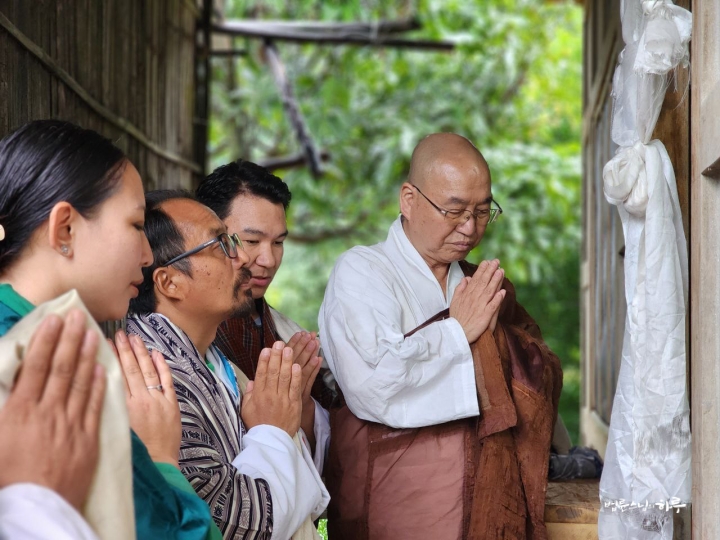
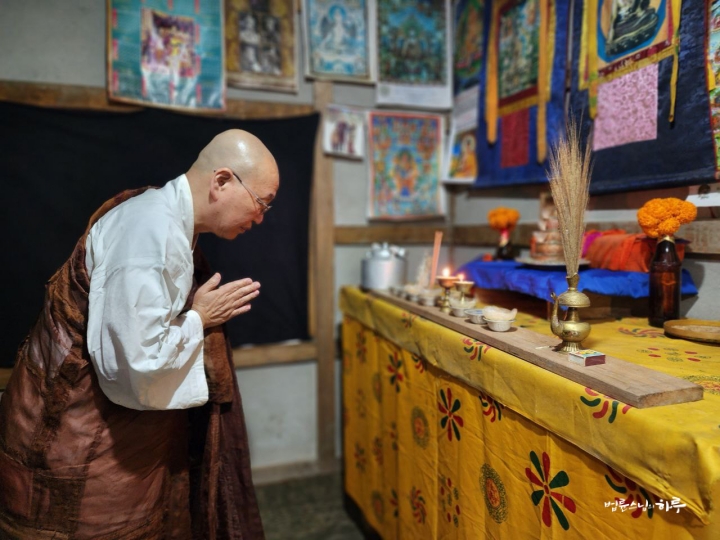
After completing the ceremony, Sunim entered the house and had a brief conversation with the homeowner.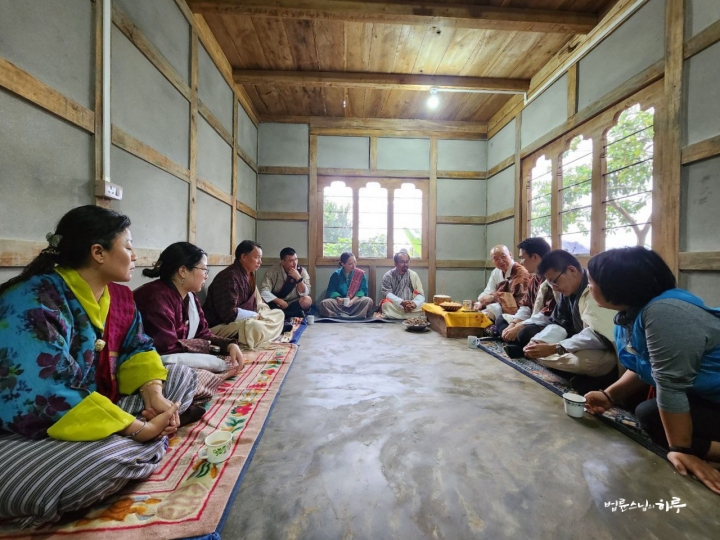
“How many family members do you have?”
“My wife, three children, and I – five of us live together.”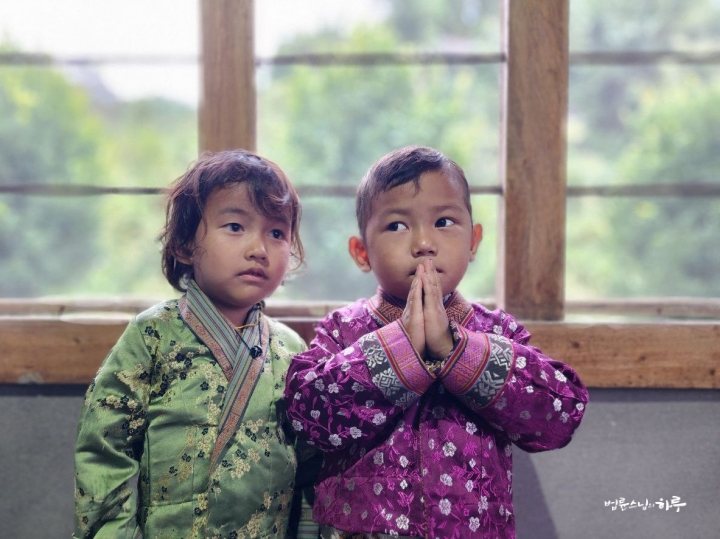
“How long have you been married?”
“15 years.”
“What did you do with the money you earned during that time? Why couldn’t you build a house until now?”
“We couldn’t build a house because we had no money. There’s hardly any work to earn money around here.”
It turned out that the homeowner was a carpenter and had built this house himself. He had done most of the work alone, receiving help from villagers only for some processes. This house was also a model home in which the governor had personally participated in the design, and satisfaction with the design was high. Seeing that the floor was finished with cement, Sunim pointed out something to be mindful of.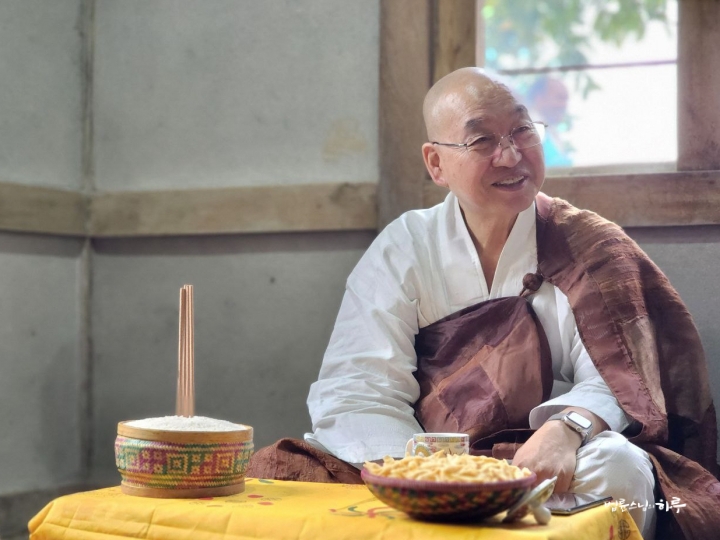
“Wooden floors like in traditional houses are fine, but cement floors can let cold air rise due to moisture. When sleeping, you must always lay down a mattress or thick mat.”
At 3:50 PM, they moved to the next house. After driving for about 20 minutes, they got out of the car and walked up the hill path again.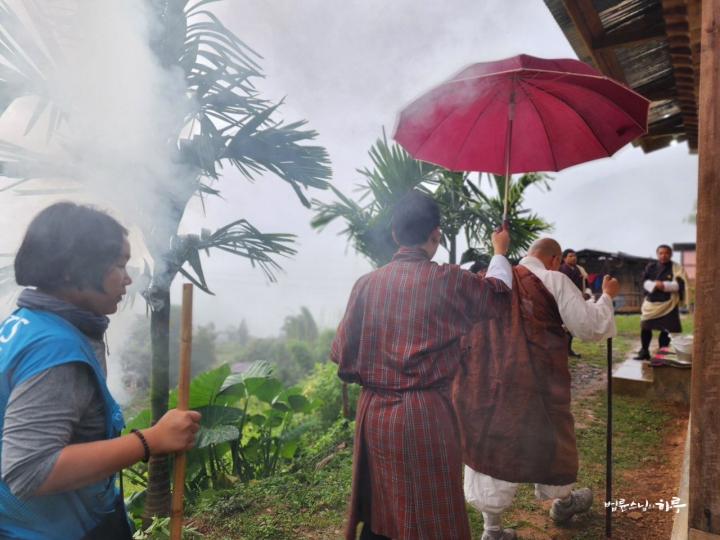
Upon arrival, the completion ceremony began immediately. They untied the white cloth hanging at the entrance and offered blessings.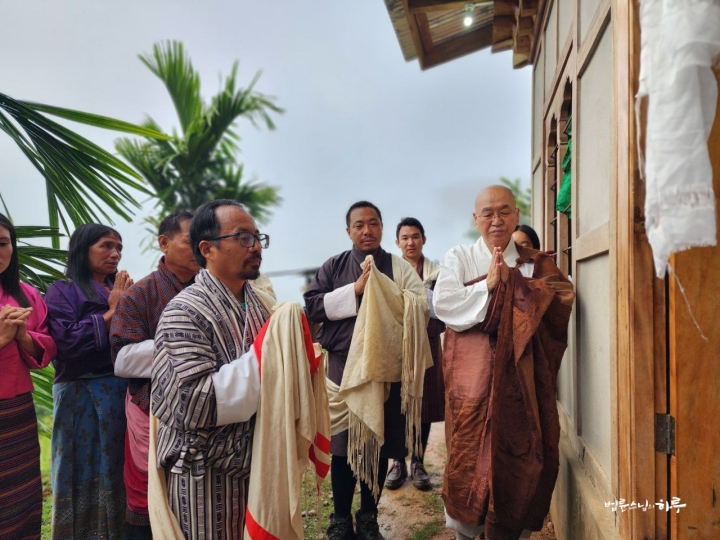
Entering the house, Sunim had a brief conversation with the family.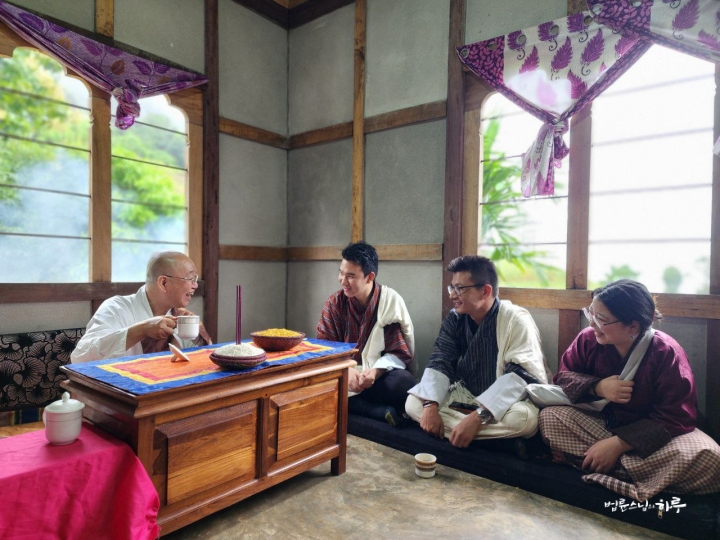
“Who lives in this house?”
“A couple, mother, and two children live together.”
“What crops do you grow?”
“We grow corn. We have about 6 acres of land.”
“How long have you been married?”
“Quite a long time. I don’t remember exactly.”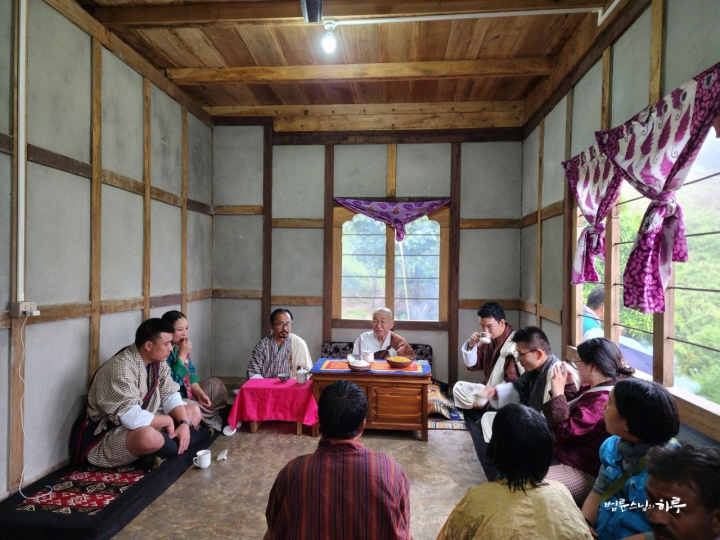
“But you have land and have been married for a long time, so why couldn’t you build a house until now?”
“We couldn’t build a house because we had no cash.”
“Did many villagers help build the house?”
“Yes, they came and helped for about two to three days.”
Sunim asked one last thing.
“Do you drink a lot or a little?”
“I only drink a little.”
“You don’t look like someone who drinks just a little. (Laughter) Having one or two drinks during festivals is fine, but many families in Bhutan suffer from alcohol problems. Please try to control yourself if possible.”
Sunim placed prayer beads in the owner’s hand and reminded him once more.
“Please don’t drink too much alcohol.”
After completing the house completion ceremonies in Rimapong village, they moved to Rimapong Elementary School to have a conversation with the residents.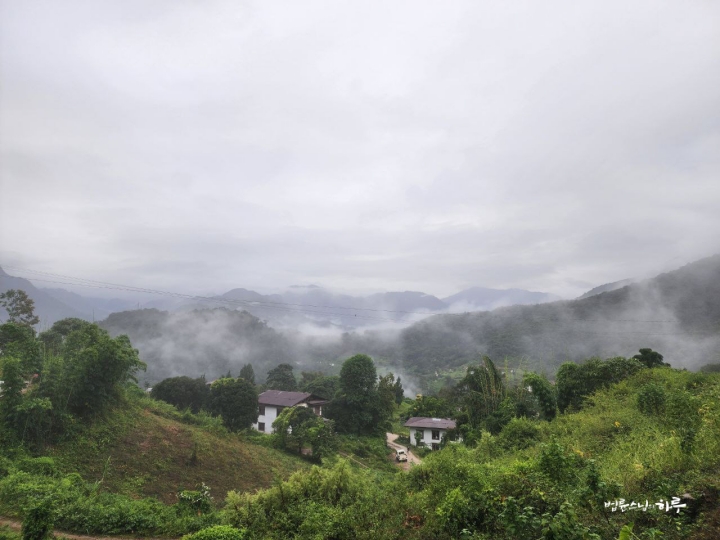
When Sunim arrived at the school at 4:40 PM, about 40 residents warmly welcomed him. Once the villagers were seated, Sunim began the conversation with a smile.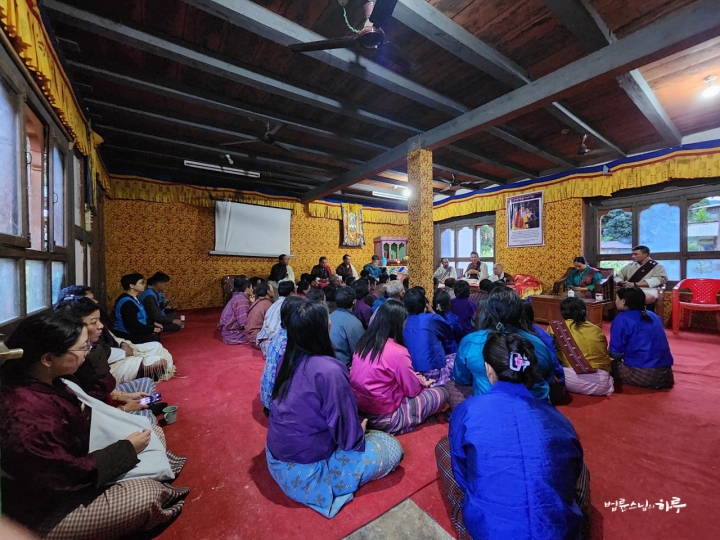
“How have you all been? We met last time during the water tank completion ceremony, right?”
“Yes, we remember.”
“You built the water tank very well then. But you’ve built two houses in just a few months. Did everyone help with building the houses?”
“Yes, we helped.”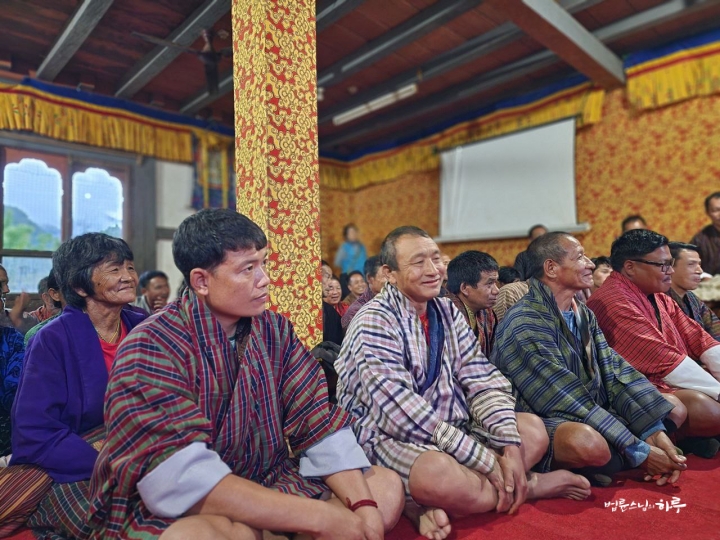
“Raise your hand if you helped for more than ten days.”
Almost no one raised their hand. There weren’t many who helped for a week, and not many who helped for five days either. Sunim asked again, puzzled.
“So most of you only helped for one or two days?”
“Yes, we only helped for one or two days.”
“How can houses be built with just one or two days of help? Did you mainly help with transportation?”
“Yes, we helped with cement plastering and material transportation.”
“The Tshogpa says they plan to build six houses by next farming season, but that would require you to work for several days each. Can you do it?”
“It’s difficult in summer, but it’s definitely possible during the off-season when there’s no work.”
“Were the completed houses small but well-shaped?”
“They were built properly and well.”
“Can houses be built with just one or two days of help? Then the homeowner has to build the house all alone, which is too difficult.”

“That’s the nature of the house-building process. Many people are needed when transporting materials, but building requires a lot of carpenter’s work. The homeowner can work alongside the carpenter to help. When transporting materials, all the villagers go and help.”
Will We Wait for the Government to Do It, or Can We Do It Ourselves?
“The purpose of this project is to make our villages more convenient and better places to live. Even when guests come from abroad, they should be able to use water conveniently, and bathrooms and kitchens should be clean. Roads shouldn’t be slippery on rainy days, and cars should be able to enter the village. This will make our lives more convenient. If we don’t develop our villages with our own hands and everyone leaves for cities or foreign countries, only elderly people will remain in rural areas in the future. Our hometowns, where our ancestors have lived for generations, will gradually become villages without people. The government provides various support for villages, but government budgets have limits. It will take a long time for all these facilities to be installed. At such times, we must choose whether to just wait or take action ourselves.
If you all decide ‘we will do it ourselves,’ JTS will provide the necessary materials for that work. If you say ‘please do this for us,’ we say ‘No,’ but if you say ‘we will do it ourselves, but we need this,’ we say ‘Yes.’ Do you understand?”
“YES!”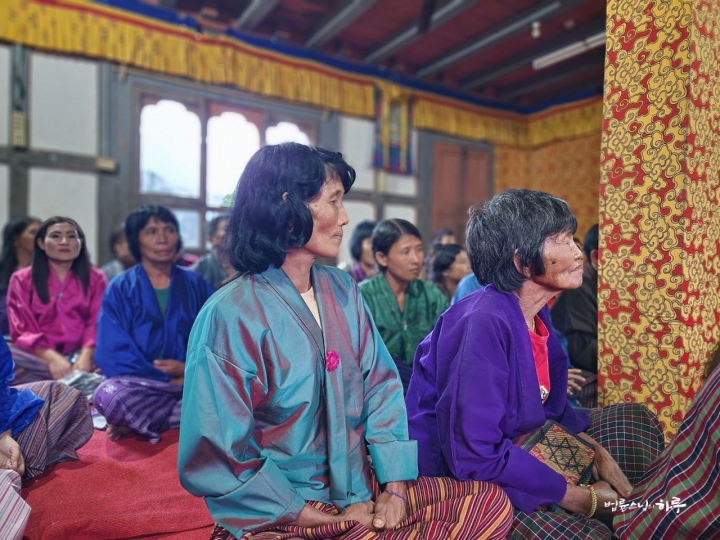
“Don’t just depend on others; let’s develop the village where we live ourselves. If we look closely at the people living in our village, aren’t we all distant relatives? So we should join forces with the mindset that ‘those without homes should have homes.’
Among the various projects JTS has done, house building seems to be the most difficult. Other projects are all shared facilities, so all villagers participate, but house building is for individual homes, so participation isn’t smooth. That’s why JTS will provide materials, so let’s work together to build houses so that no one in our village is without a home. Let’s make it so that within three years, we can confidently say ‘there’s not a single person without a home in Rimapong village.’ So let’s all join forces and do this. Can we do it?”
“Yes.”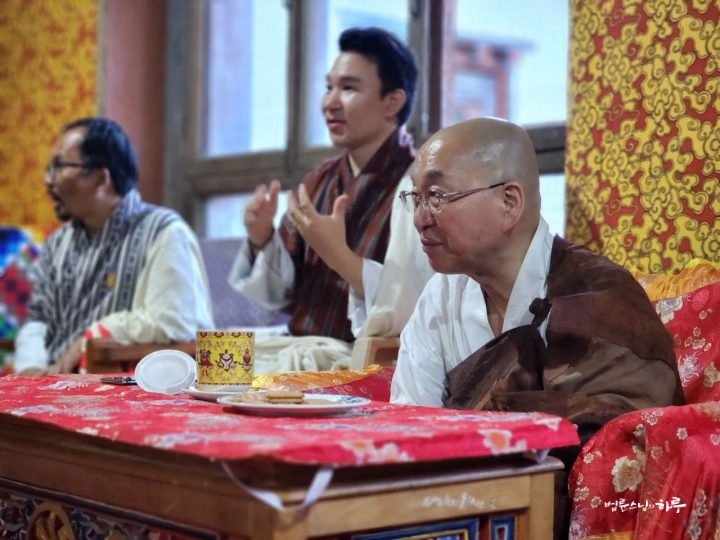
“Thank you all for your hard work building two houses. After harvesting rice, let’s start building houses again and build houses in each village until we start farming next spring. During the off-season, instead of just drinking alcohol all the time, let’s do some good work like this. That’s why Governor Jemgang is promoting a campaign to drink less alcohol. First, let’s do urgent things during the off-season, and then we need to work on making products that can generate income. It’s difficult to make a living with just corn and rice farming. So we need to prepare for work that will generate supplementary income during the off-season.
You’ve all worked hard, but the gift I brought is only this small. That’s because I can’t load large quantities on the plane. Please accept it as my sincere gesture even though it’s small.”
After finishing the conversation and distributing gifts, he took a commemorative photo with all the village residents.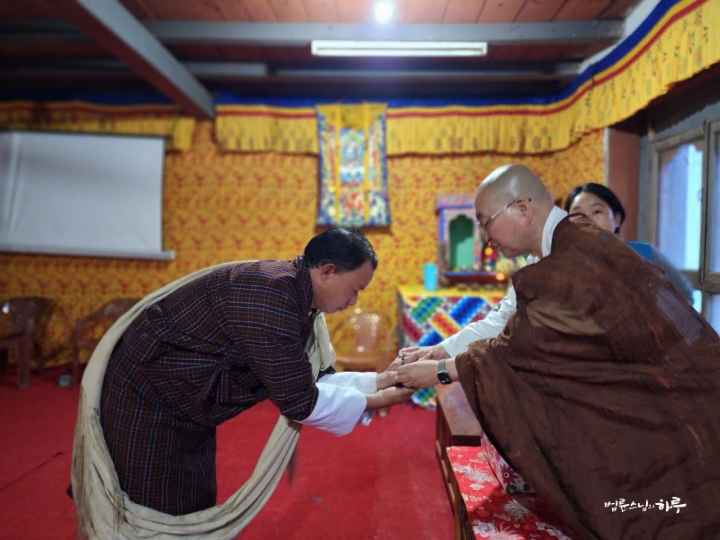
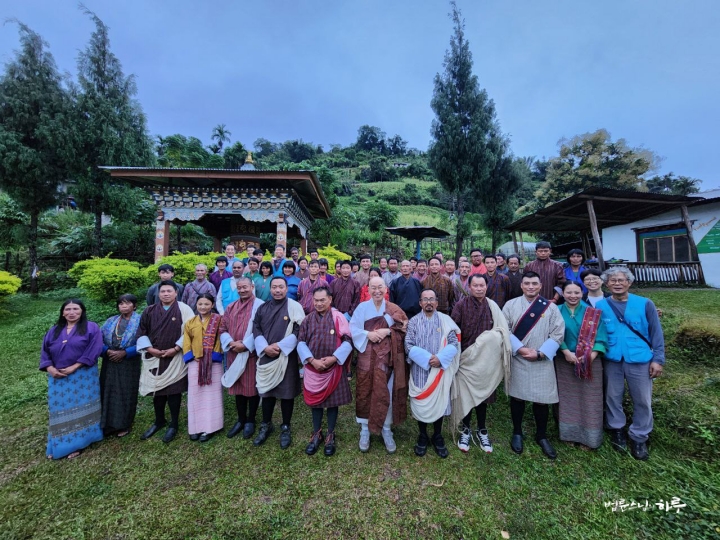
Before leaving, Sunim conveyed words of apology to the residents.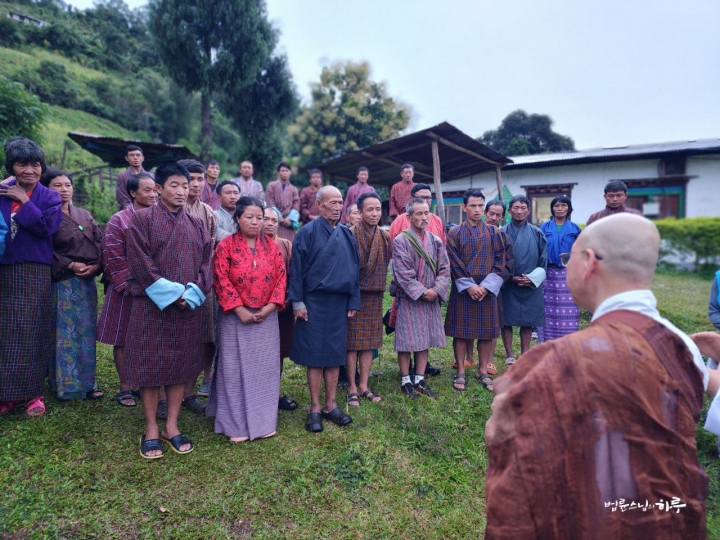
“I’m sorry that the schedule kept changing this time. A major event called the APEC Summit is currently being held in Korea. Because of that, the schedule was adjusted several times. Moreover, yesterday the flight was delayed due to rain, making it even later. Thank you for your understanding.” 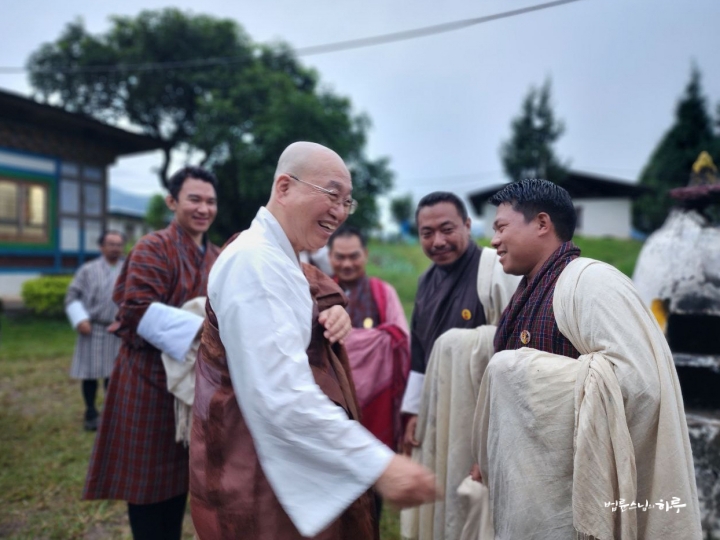
At 5:10 PM, they got back in the car and headed to Pantang where the JTS Center is located. Although there was an incident where the front tire was punctured by a rock that had fallen from the mountain just 2-3 minutes before arrival, fortunately they arrived safely at the center without any major accidents.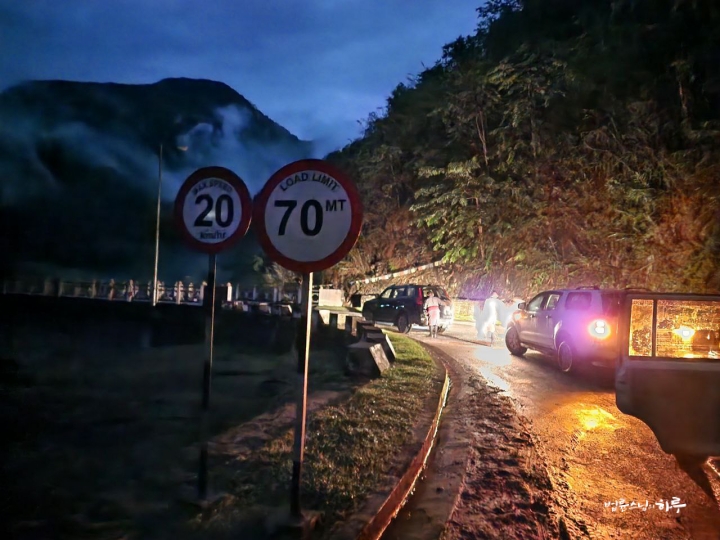
Deputy Governor Jemgang was waiting for Sunim in front of the center. After exchanging warm greetings, they entered the center.
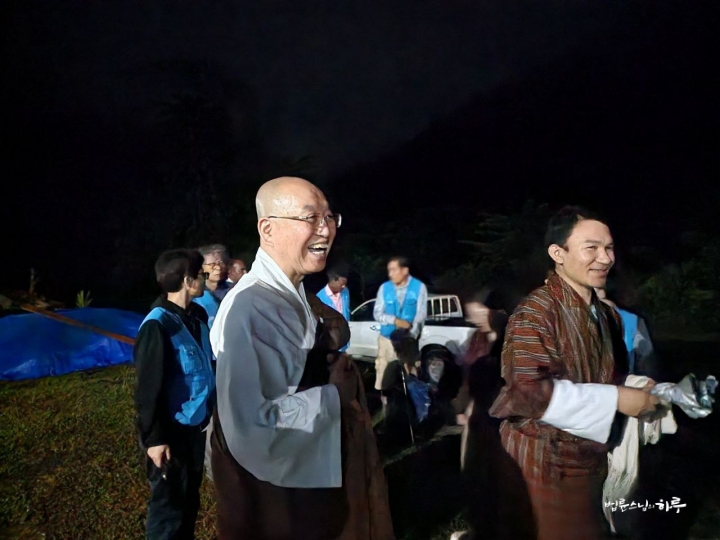
After dinner, evening prayers were held, and from 7:20 PM, Sunim conducted a meeting with JTS volunteers. The meeting discussed the progress and issues of various field projects, including sample house and kitchen construction, carpentry training, and school repairs.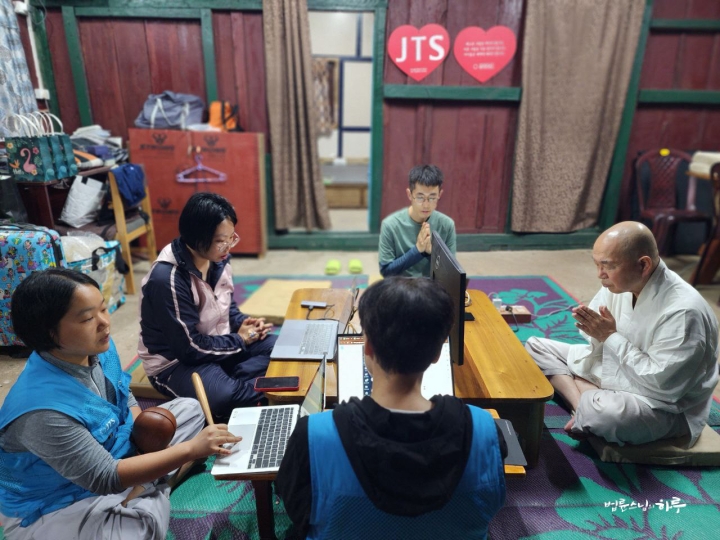
Sunim provided practical and sustainable guidance on issues that arose during village support activities, particularly regarding carpenter wage support standards, resident participation methods, and material management systems. The volunteers organized response strategies according to each gewog’s situation and agreed to reorganize their work to help Bhutanese residents achieve self-reliance.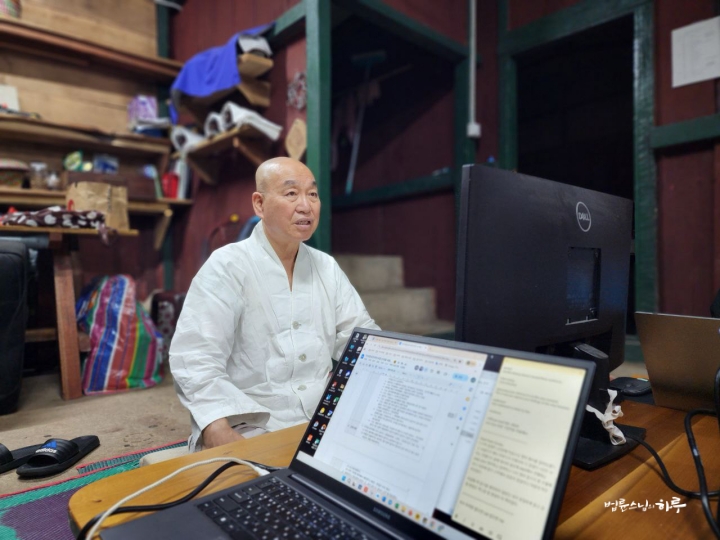
The meeting concluded at 9 PM, bringing a long day to an end.
Tomorrow morning, Sunim will travel to Bardo Chiwog for a completion ceremony of a newly built house and dialogue with residents. In the afternoon, he will move to Komshar Chiwog to inspect irrigation channels and water sources, then proceed to Langdelbi Chiwog for another house completion ceremony and resident dialogue. After visiting the renovated facilities at Pantang Elementary School, he will return to the JTS Center in the evening for dinner with Zhemgang officials.





